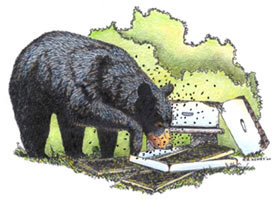 Introduction
Introduction
Black bear populations in Maryland have increased dramatically over recent years. Sightings have been reported in all western counties, but significant bear population expansion has occurred predominantly in Garrett and western Allegany Counties. Increased numbers of bears have also increased the number of bear damage and depredation complaints. The majority of these have been raids on beehives. This brochure offers some suggestions for beekeepers about protecting their property from damage caused by bears.
Nature of the Problem
A bear’s fondness for honey is legendary, for legitimate reasons. You could not manufacture a better bear food than a bee hive. Protein is available as bees. Brood and honey are energy producing carbohydrates. This source of food is particularly desirable in the spring when bears leave their winter dens. The proverbial bull in the china shop is no comparison to a bear in the beeyard when it comes to damage and destruction.
Hive protection is based on denying a bear access to the hive. This can be accomplished by fencing, either electric or mechanical, and /or placing hives on elevated platforms. It is important that preventative measures be put in place before bears leave their dens in mid-March. Bears quickly learn where food is, and they just as quickly learn not waste energy where food cannot be obtained. This means that your hives are not likely to be damaged if they are protected on a bears first visit. Once bears find an unprotected beeyard, they often return. Exclusion thereafter, may prevent further damage, but it is more difficult.
Protection Methods
Electric Fences: A properly constructed electric fence usually deters bears from beeyards. Several styles and designs are available. Some can be made permanent for a beeyard that will not be moved or temporary transportable designs are available.
Several key elements make standard electric fences more effective against bears. A four strand fence with a strand set at 8, 20, 32, and 44 inches above the ground will work well since bears usually try to go under a fence. A small piece of bacon tied to the strands and coated with honey or molasses entices a bear to smell or lick the wire, thus receiving a shock in it’s sensitive nose or mouth. Barbed wire may be more effective than regular smooth, electric fence wire because electrified barbs penetrate fur making better contact. Generally, electric fencing is the least expensive way of solving most bear depredation problems in beeyards.
Where bears have raided a beeyard, the Maryland Wildlife and Heritage Service can provide temporary loan of an electric fence charger and fencing material can be conditionally supplied. Assistance may also be provided in construction of a temporary style electric fence. Obviously, it is better to install protection prior to a bear raid and thus receive no damage. Maintenance of the temporary electric fence is the responsibility of the hive keeper. More information is available by contacting the Wildlife and Heritage Service offices listed in this brochure.
Click here for Electric Fence Set Up & Tips on Fencing
Mechanical Fence: It is possible to keep bears out of beeyards using a heavy gauge woven wire panel fence topped with two strands of barbed wire set out on brackets at a 250 degree angle. This method can be used where electric fencing is impractical.
Elevated Stands: In some areas bear depredation can be discouraged by placing hives on elevated platforms or roof tops. It is important that the platform is constructed in such a manner as to prevent access by climbing bears. Bears which gain access to beehives placed on elevated platforms can be very destructive in knocking hives onto the ground.
Summary
Bears can do considerable damage to beeyards causing loss of property and income. However, well designed exclusionary methods implemented early and maintained in good working order usually protect from such losses. The Maryland Wildlife and Heritage Service will assist beehive owners wherever possible.
For information on Maryland’s Black Bear Management Program, please contact:
Maryland Wildlife and Heritage Service
Billmeyer Wildlife Management Area
11701 Mountain Road, NE
Flintstone, MD 21530
301-478-2525
Maryland Wildlife and Heritage Service
Indian Springs Wildlife Management Area
14038 Blairs Valley Road
Clear Springs, MD 21722
301-842-2702
Maryland Wildlife and Heritage Service
Western Regional Office
12512 Pleasant Valley Road
Flintstone, MD 21530
Maryland Wildlife and Heritage Service
Mt. Nebo Wildlife Management Area
1728 Kings Run Road
Oakland, MD 21550
301-334-4255
Illustration by Wade Henry